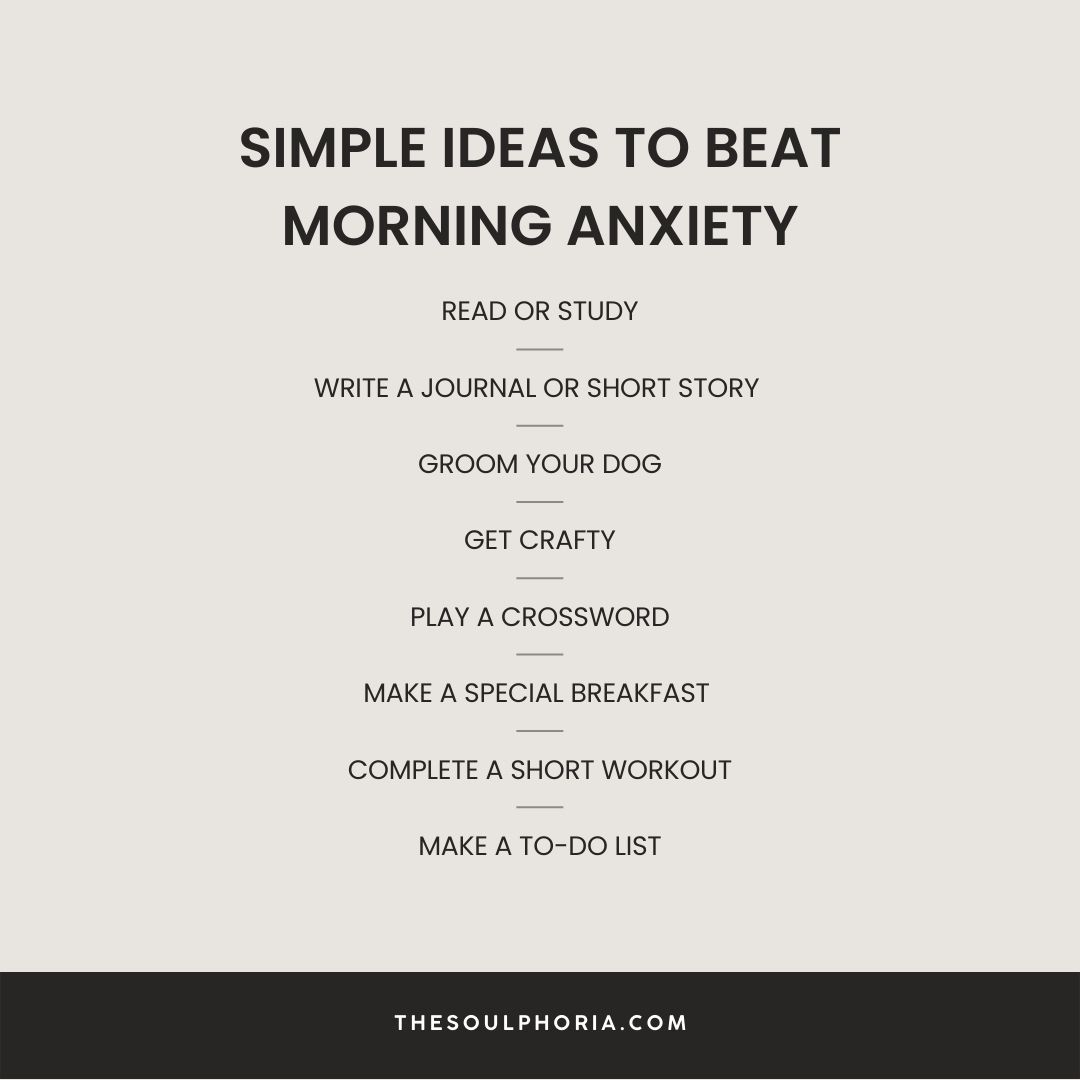What a beautiful morning. How often do you think that after you open your eyes? Chances are, not so much.
It's such a crucial time of the day. An opportunity to start with a good attitude, right? But how do you actually feel? Do you approach your day with a smile or feel irritated, anxious and negative thoughts are spinning in your head?
Maybe you at least enjoy your morning on the weekends when there's no rush. But during workdays, mornings can be a hectic period that we try to pass quickly or slow torture where you try to avoid your emotions and responsibilities.
It wasn't my favorite part of the day either. Functioning like a normal human being usually came to me around lunchtime. Until then, everything seemed grey, and I lacked the motivation that gets me going in the afternoon. Maybe I am just a night owl, but my whole daily productivity was compromised thanks to these anxious mornings.
And let's face it that despite mornings being often presented as a perfect time for a great new start, there are more than enough people who don't feel that so much. Whether it's general stress, personality or difficult circumstances, anything can make you rise with feelings of dread.
Unsurprisingly any morning mood can cling to you for the rest of the day, so that's why it's so beneficial to start working on your wellbeing right after you open your eyes. Your days don't have to set off always the same, and luckily there are ways to change it.
Step 1 - Seek a quick achievement
Most of the advice out there will suggest things like meditating, making tea or writing a gratitude journal. Well, I don't say these things are not helpful, but it takes something more powerful to change your present emotions, something stronger than espresso.
So do what makes YOU the greatest joy.
The human is a simple creature naturally looking for pleasure and satisfaction. That's why you should choose relatively uncomplicated activities that can quickly bring these feelings of achievement. Instant happiness. You need that kind of action to cut the chain of negative thoughts and instead direct it to things that actually matter to you.
Now, you definitely experienced the little moment of bliss when you contentedly check an item from your to-do list. And what about several at once. I am sure we all secretly love creating lists and checking boxes.
It's a simple example of little success that can boost your mood without effort. You happen to do these things automatically throughout the day, and they keep you going forward with tiny injections of "happy hormones "without you even noticing. But when you suffer from morning moodiness, you have to do activities on similar principles deliberately. You have to plan them for yourself.
Even though anxiety can be a complex problem, you can loosen its grip only by engaging in something rewarding that will, in turn, change your mindset. Your thoughts have to focus on a new direction. Fortunately, like with everything in life, repetition makes any activity easier until they become automatic. At first, you may feel better only for a while, but these moments will get longer. Your body will get used to the new morning setup, and maybe you'll enjoy it for the first time.
Why it works
This whole trick works thanks to dopamine and other neurotransmitters, which are part of the brain's reward system. When the brain registers that a specific activity brought you joy or success, it releases a small amount of dopamine to motivate you to repeat this activity in the future.
The bigger your success, the more dopamine is released. We can say the same applies if the brain can certainly determine that the success has happened. It's what makes manual activities so popular - you have physical evidence of your labour.
Everybody likes something different. For example, many people today try meditation and chanting, which have become extremely popular. However, from my own experience, spiritual practice works better if you're already on the right path and want to reinforce that positive effect.
Simple things that you can try:

Try to come up with your own unique ideas. For example, you can draw from your current or past hobbies or start something completely new.
Step 2 - Make it a routine
Our brains love routines. It's our evolutional heritage. The mind needs something to look forward to that will undoubtedly happen. It brings assurance and calmness. Otherwise, we may feel a lack of purpose and consequently lose our driving force.
Routines are extra important for managing anxiety because they represent an anchor for the mind. In particular, during difficult times with uncertainty all around, keeping a routine is the primary defence recommended by many psychologists. Even though everywhere is chaos, its power lies in the possibility of coming back to an everyday activity that brings hope and purpose. Suddenly you can feel the world is still a safe place.
So when you incorporate some new activity, try to stick with it and do it rigorously every morning, without exception. No matter how you feel, wake up consistently at the same time. Don't hit the snooze button 3 times (or maybe 10 if you're like me). Avoid laying in bed as this will make you more likely to start ruminating, and don't immediately scroll through your phone. Instead, just quickly get up and go do something, for example, brush your teeth or anything you like to do first thing in the morning.
Also, try to steer clear of passive activities like watching tv shows or getting lost in social media feeds. Everybody is naturally inclined to their comfort. But although it can momentarily soothe you, it'll make you stuck in place in the long term because you're only getting a fake feeling of satisfaction.
While there are many great books and guides on putting together the perfect morning routine, the most important point is that everything should be in tune with your personal interests. For some people, it's possible to get up at 4am to squeeze in a workout before they turn on the computer and the rest of the family wakes up. But this super early routine doesn't have to be right for you. Don't force what doesn't feel right - for example, taking on running when strength training is more your element.
Ultimately you can have less anxiety and the most rewarding morning routine of your life if you put in the work. Just let a little time pass and you'll see.
Step 3 - Incorporate other healthy habits
If you want to push your game to the next level, try to incorporate other guaranteed mood boosters for an ultra-productive morning.

Food
Prepare a delicious breakfast that'll nourish your body. There's nothing worse than eating super healthy food that tastes like cardboard. Or actually, there is. A healthy meal that tastes and also looks like cardboard. So please, don't eat garbage even when you really don't want to think about preparing a meal and wasting time. That lousy mood likes to attract cravings for muffins, doughnuts and other sweet treats and then manifests itself around your waistline.
Focus on creating a breakfast that'll please all your senses. Your body deserves the best fuel, especially when you're anxious, because it burns through specific nutrients like magnesium and B-vitamins much faster, thus making you prone to even more nervousness and tiredness.
Making an effort to prepare an insta-worthy omelette for yourself or your whole family can concentrate you on the day's first task. You don't have to be any master chef for this, but you can definitely grow your cooking skills as a byproduct.
Exercise
Probably every wellness expert recommends a morning exercise. It can alleviate anxiety within 12 weeks, even if the condition is chronic, lasting more than 10 years. Certain types of exercise have specific benefits, but all have one thing in common - improving blood flow, boosting digestion and metabolism and promoting stress relief. You'll feel calmer and balanced with yoga, while 20min HIIT will pump you with endorphins and energize you.
While high-intensity exercise can be a little bit more beneficial than low intensity, you want to do the exercise you'll actually like, and that'll fit well in your schedule. Even walking a dog counts. So while your furry friend is doing its thing, you can try power-walking, chat with your neighbour or grab a fresh coffee.
Cold showers
This activity is a kind of shock therapy and thus certainly not for everyone. Even if you wake up on the most positive note, almost nobody wants to get voluntarily under ice-cold water. Especially in the winter seconds after you stick your nose out of the soft, warm bed. Why on earth, you say, would you do something so unpleasant when you already feel miserable. The reason is simple. It takes strong will and courage to do something hard. When you endure challenging moments, it sends a clear signal to your mind that you can overcome obstacles, promoting your self-worth and confidence.



